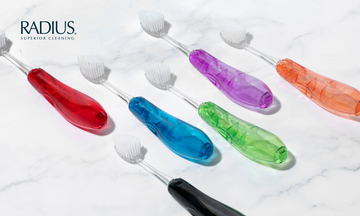We've all heard it countless times – brushing our teeth is crucial for maintaining good oral hygiene. But here's a little-known secret: the effectiveness of your toothbrush plays a pivotal role in this daily ritual. We often focus on the right toothpaste and brushing technique, but one question often goes unanswered: How often should you replace your toothbrush? In this blog, we explore this question with a particular emphasis on RADIUS toothbrushes, known for their innovative design and long-lasting performance.
Why Should You Replace Your Toothbrush?
To understand when and why to replace your toothbrush, it's essential to grasp the role of this trusty dental tool in your daily oral care routine. Your toothbrush is responsible for removing food particles, plaque, and bacteria from your teeth and gums. Over time, these bristles become worn and frayed, rendering them less effective in their primary task.
Moreover, toothbrushes are not immune to accumulating harmful bacteria themselves, which can be reintroduced into your mouth if you continue using an old, worn-out brush. These factors can lead to reduced cleaning efficiency and even oral health issues, which is why it's vital to replace your toothbrush regularly.
The RADIUS Difference
RADIUS, a renowned name in oral care, offers a unique approach to toothbrush design. Unlike conventional toothbrushes with narrow, straight handles, RADIUS toothbrushes feature a wide, oval-shaped handle. This innovative design is not only ergonomic but also environmentally conscious, as it reduces plastic waste. Their toothbrushes also use premium, durable materials, which contribute to a longer lifespan, making them a top choice for those looking to reduce their environmental impact.
How Often Should You Replace Your RADIUS Toothbrush?
The frequency of replacing your toothbrush can vary based on factors such as your oral hygiene habits, the type of toothbrush you use, and personal preferences. However, as a general guideline:
- Every Three Months: The American Dental Association (ADA) recommends replacing your toothbrush every three to four months or sooner if the bristles appear frayed. This rule of thumb applies to most toothbrushes, including RADIUS.
- RADIUS Exception: Thanks to the durability of their materials and unique design, RADIUS toothbrushes may last longer than the average toothbrush. You can often use a RADIUS toothbrush for up to six months, depending on your usage and maintenance.
- Special Considerations: If you've been sick, it's a good practice to replace your toothbrush once you've recovered. This minimizes the risk of reinfection and maintains good oral hygiene.
- Children and Toothbrush Replacement: Children's toothbrushes may need more frequent replacement, as they often brush with more enthusiasm and can wear down bristles faster.
Signs It's Time to Replace Your RADIUS Toothbrush
While the ADA guideline provides a general rule for toothbrush replacement, it's essential to keep an eye out for specific signs that indicate it's time to part ways with your RADIUS toothbrush:
- Frays and Bends: If you notice bristle fraying, bending, or splaying, it's a clear sign that your toothbrush is no longer as effective as it should be.
- Wear and Tear: Examine the handle of your RADIUS toothbrush for signs of wear, such as cracks or discoloration, which can affect its structural integrity.
- Bacterial Buildup: If you've been ill, it's a good idea to replace your toothbrush to prevent reintroducing harmful bacteria into your mouth.
- General Hygiene: Regardless of the timeline, trust your instincts. If you feel that your toothbrush isn't as clean and effective as it used to be, it's time for a replacement.
In conclusion, maintaining good oral hygiene is not just about the toothpaste you use or the technique you employ. The condition of your toothbrush matters too. With RADIUS toothbrushes, you can enjoy an eco-friendly, durable option that can often last up to six months. However, be sure to keep an eye on the signs of wear and tear and follow ADA guidelines to ensure optimal oral health. After all, a healthy smile is worth the investment in a quality toothbrush.

